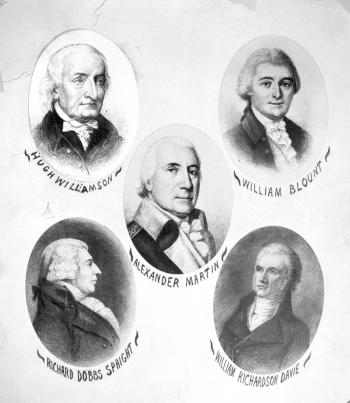It’s Constitution Week! This week we are celebrating the signing of the U.S. Constitution, our nation’s governing document. Each day, you will find a blog about constitutions in America. These blogs serve to educate on the thing that has historically defined government in the United States – the rule of law.
North Carolina sent five delegates to the Constitutional Convention in the summer of 1787: William R. Davie, Richard Dobbs Spaight, Alexander Martin, William Blount, and Hugh Williamson. (Fun fact: Originally, Blount and Williamson were not chosen to go. In their place were Governor Richard Caswell and William Jones, but they both declined.) Of the five delegates, Williamson was actively engaged, but Davie and Spaight rarely entered debate, and Blount and Martin were “hardly there.”

The North Carolina delegates were not the most attention-grabbing. Former Notre Dame Professor Walter F. Pratt, Jr. wrote:
“Of all southern states, North Carolina had the least apparent impact on the formation of the Constitution and of the Bill of Rights.”
North Carolina’s role in the constitutional convention was more of a peacemaker. For instance, the North Carolina delegation played a pivotal role in the Connecticut compromise, which established a bicameral legislature with proportional representation in the House and equal representation in the Senate. North Carolina was the only large state to vote for the compromise along with four smaller states: Connecticut, New Jersey, Delaware, and Maryland. The North Carolina delegates clearly understood the importance of compromise at the convention, as just 12 days earlier, on July 2, Delegate Williamson stated:
“If we do not concede on both sides, our business must soon be at an end.”
Since delegates could revoke their vote on any subject at any time during the convention, North Carolina’s delegates took it upon themselves to defend the compromise. Walter F. Pratt, Jr. wrote:
Thereafter, the North Carolina delegates, led by Williamson, staunchly defended the compromise. Later efforts to dilute the compromise 110 elicited the most vehement comment by Williamson during the entire summer. His support, he said, had been “a matter of conscience.”
North Carolina had a hand in many other compromises during the convention, from the three-fifths compromise to compromising on how to vote for a president and on what offices former legislators could hold. Overall, North Carolina helped bridge the divide between Northern/Southern states, large/small states, and transportation/agricultural states. The delegates’ flexibility in decision-making helped the nation devise a constitution that has lasted more than 200 years.
Test your knowledge of your federal and state constitutions by taking our Constitution Week Quiz HERE!


